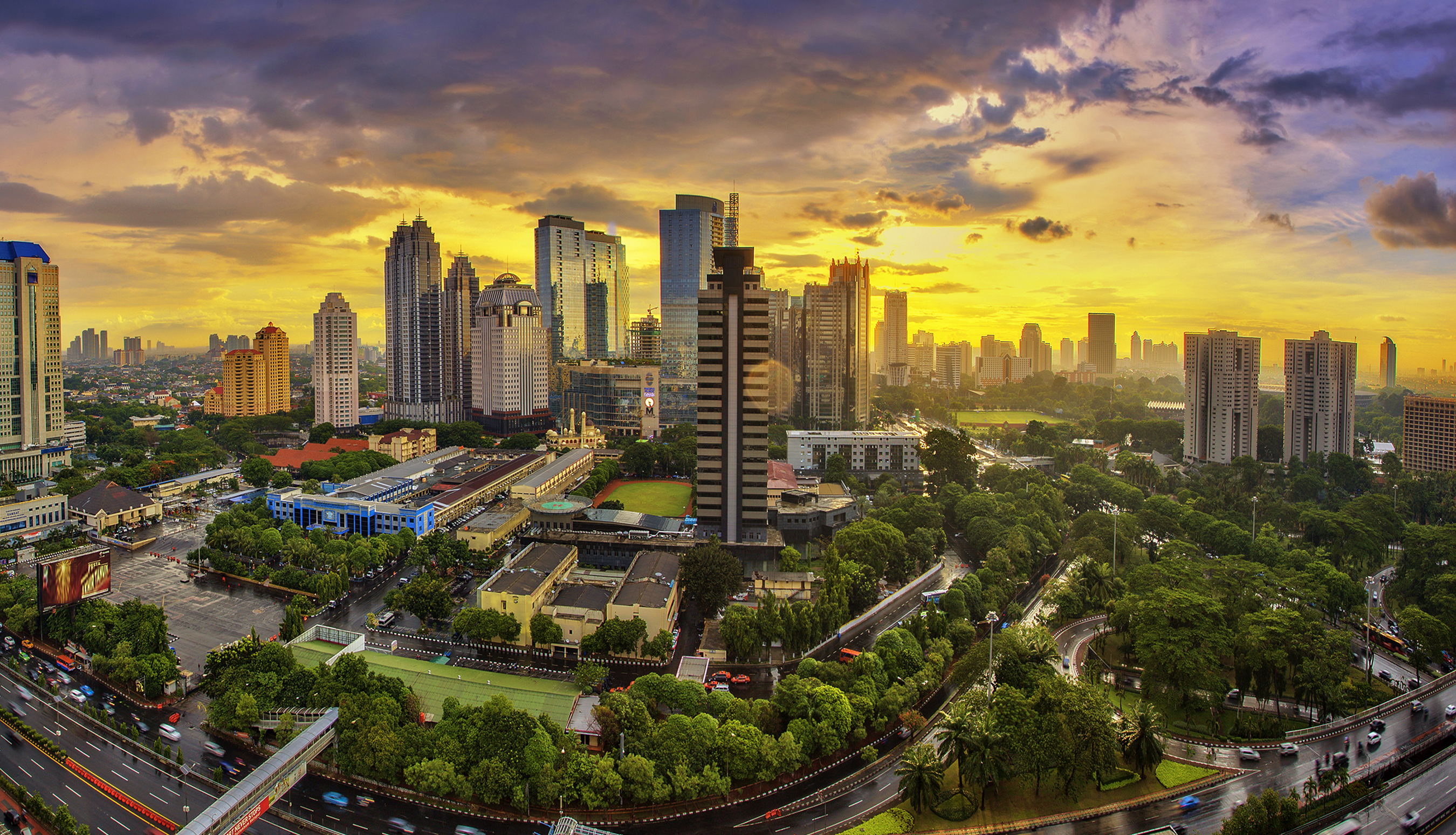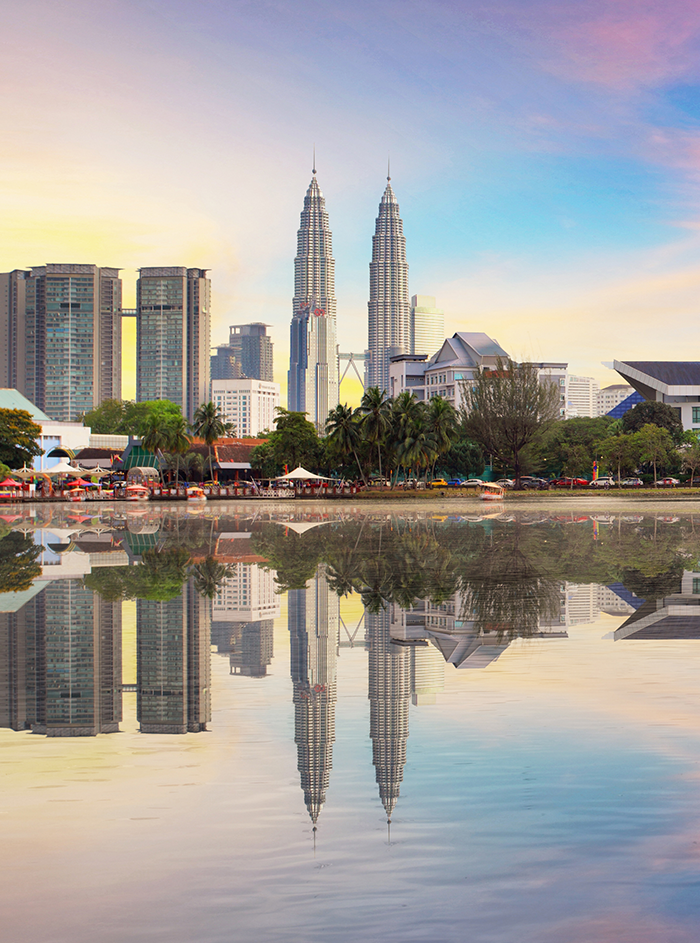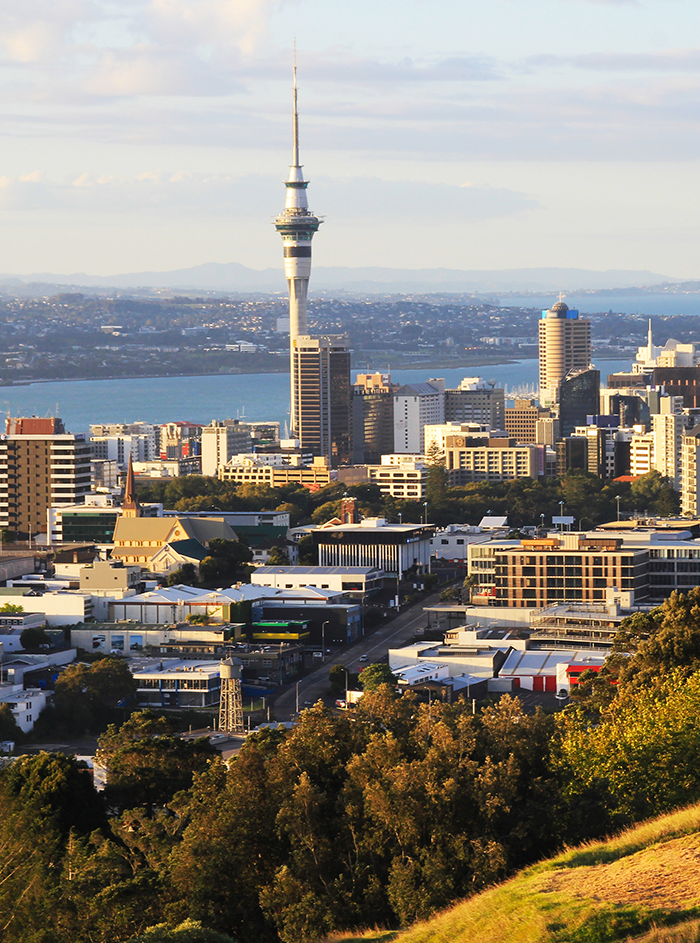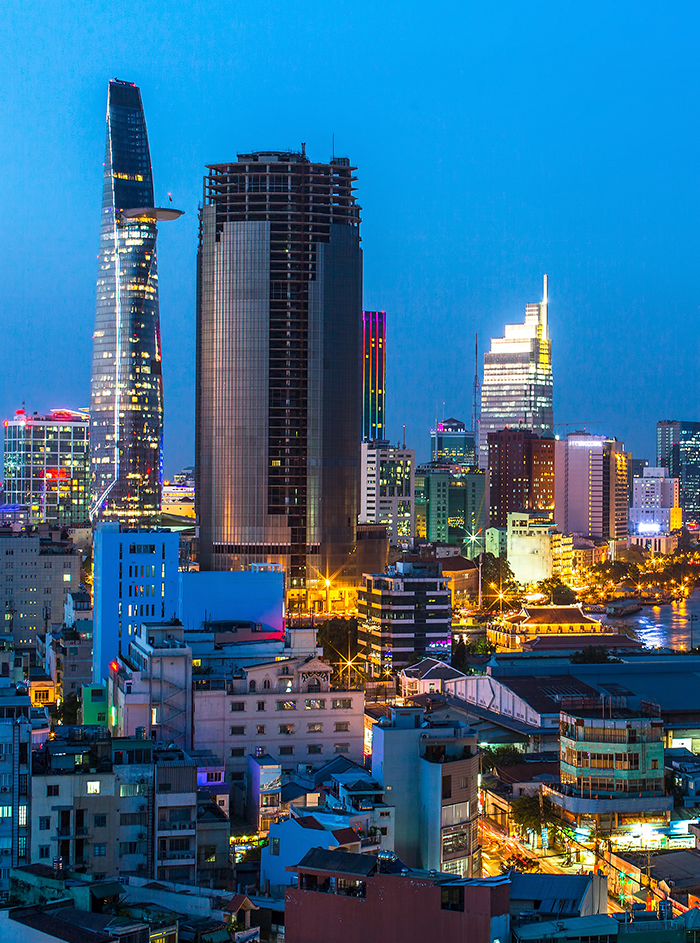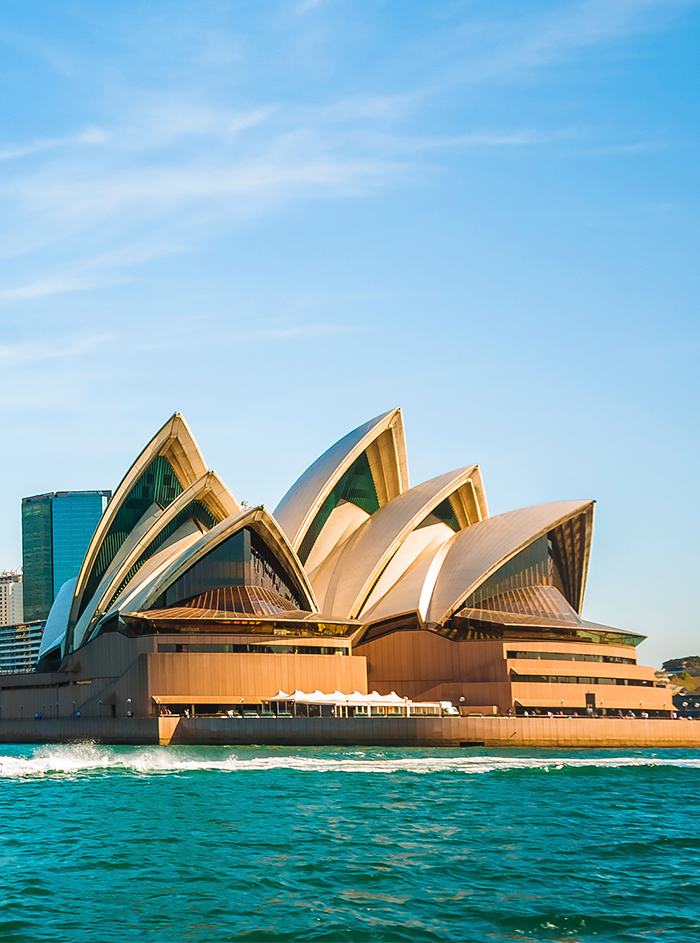Indonesia
Contributing law firm: SSEK Law Firm
YEAR IN REVIEW
(1 July 2024 to 30 June 2025)
- Sustainability disclosure standards based on IFRS S1 and S2 have been finalised by the Indonesian Sustainability Standards Board. Full implementation will begin 1 January 2027, with a three-year transition period. The standards mandate climate-related disclosures, while reporting on other sustainability topics (beyond climate) remains voluntary.
- Local content rules for solar power projects have been temporarily relaxed for eligible projects.
- The Roadmap for the Energy Transition in the Power/Electricity Sector has been issued, setting out a path to reduce emissions, retire coal-fired power plants early, and boost renewable energy transition. In parallel, Indonesia’s mandatory emission trading system is due to expand to cover more power plants later this year.
Scroll down or click below for further information on each key theme.
PODCAST OVERVIEW
Please click on the podcast above for a snapshot of the three key themes of ESG reporting, transition planning and greenwashing risks in respect of Indonesia.
KEY CONTACTS
 |
Ira A. Eddymurthy |
 |
Michael S. Carl |
A. ESG Reporting
Yes, ESG disclosures are mandatory for publicly listed companies and financial institutions.
- Financial Services Authority (Otoritas Jasa Keuangan or OJK) Regulation No. 51/POJK.03/2017 of 2017 regarding the Implementation of Sustainable Finance for Financial Service Institutions, Issuers (Emiten), and Public Companies (dated 27 July 2017) (OJK Reg. 51/2017). This regulation generally imposes the obligation for financial service institutions, issuers and public companies to implement sustainable finance and to submit a Sustainability Report, either as part of their annual report or as a stand-alone report, annually to the OJK and to make the report publicly accessible.[1]
- OJK Circular Letter No. 16/SEOJK.04/2021 regarding the Form and Substance of the Annual Report of Issuers (Emiten) and Public Companies (dated June 29, 2021) (OJK CL 16/2021). OJK CL 16/2021 governs the form and content of ESG disclosures in the annual reports of publicly listed companies and issuers. For example:
(i) the annual report shall include a list of industry associations (national or international) related to the implementation of sustainable finance;[2]
(ii) the annual report shall disclose, among other things, the actions taken by the company as part of its social and environmental responsibility. This disclosure shall be the Sustainability Report as per OJK Reg. 51/2017. The relevant explanations must at least include:
• the company’s sustainability strategy;
• a summary of the company’s sustainability efforts (economic, social, and environmental);
• brief profile of the publicly listed company;
• Board of Directors’ remarks;
• sustainable governance;
• sustainable performance;
• written verification from independent party(ies), if any;
• feedback from readers, if any; and
• response of the publicly listed company to the feedback from the previous year’s report.
- OJK Regulation No. 17 of 2023 regarding the Implementation of Governance for General Banks (dated 14 September 2023) (OJK Reg. 17/2023) mandates that banks must prepare and publish a sustainability report guided by OJK Reg. 51/2017.[3]
- The Minister of State-Owned Enterprises (MSOE) Regulation No. PER-2/MBU/03/2023 of 2023 regarding Guidelines for the Organization and Significant Corporate Activities of State-Owned Enterprises (dated 24 March 2023) (MSOE Reg. 2/2023). State-owned enterprises (SOEs) are required to prepare reports on a quarterly and annual basis through their Board of Directors containing, among other information, reports on the implementation of their social and environmental programs.[4] These reports must also be made accessible to the public.[5] A sustainability report may be drafted as part of the aforementioned publicized annual report.[6]
- Presidential Regulation No. 60 of 2023 regarding the National Strategy on Business and Human Rights (dated 26 September 2023) (PR 60/2023). This regulation requires the Regional Business and Human Rights Task Force, the National Business and Human Rights Task Force, and the Ministry of Law and Human Rights (MOLHR) to report on the implementation and outcome for Business and Human Rights Actions (BHAM Action).
BHAM Action refers to strategies and steps that elaborate on the National Strategy on Business and Human Rights, which serve as guidelines for stakeholders, e.g. government organs, institutions, agencies and business actors, to improve the protection, respect and remedy of human rights. This reporting is to take place in the following sequence:
(i) The Regional Business and Human Rights Task Force reports the outcome of the BHAM Action implementation to the National Business and Human Rights Task Force (GTN BHAM);[7]
(ii) GTN BHAM reports the outcome of the BHAM Action implementation to the MOLHR;[8]
(iii) the MOLHR reports the outcome of the BHAM Action implementation to the President of the Republic of Indonesia.[9]
These reports will be published and therefore will be accessible to the public.[10] It is important to note that PR 60/2023 merely serves as a roadmap and national strategy for the formulation of binding regulations to be issued in the future. - Law No. 40 of 2007 regarding Limited Liability Companies (dated 16 August 2007), as last amended by Law 6 of 2023 regarding the Stipulation of Government Regulation in Lieu of Law No. 2 of 2022 regarding Job Creation into Law (dated 31 March 2023) (Law No. 40/2007). This law requires limited liability companies to include a disclosure on the fulfilment of social and environmental responsibilities in their annual reports.[11] Further details governing such responsibilities are set out under Government Regulation No. 47 of 2012 regarding the Social and Environmental Responsibilities of Limited Liability Companies (dated 4 April 2012).
[1] Arts. 1 point 13, 2(1), 10(1)-(3), 12, OJK Reg. 51/2017.
[2] Pages 26-27, OJK CL 16/2021.
[3] Art. 96, OJK Reg. 17/2023.
[4] Arts. 214(1)(g), 217 (1)(g), MSO Reg. No. 2/2023.
[5] Art. 221(2)(c), MSO Reg. No. 2/2023.
[6] Art. 221(3), MSO Reg. No. 2/2023.
[7] Arts. 7(5)(c), 12(1), PR 60/2023.
[8] Arts. 5(d), 12(1), PR 60/2023.
[9] Art. 12 (2), PR 60/2023.
[10] Art. 12(3), PR 60/2023.
[11] Art. 66(2), Law No. 40/2007.
The disclosure requirements envisaged in the abovementioned regulations are mandatory, with the exception of the sustainability report referred to in MSOE Reg. 2/2023. Non-compliance with the aforementioned disclosure requirements is sanctionable, save for those required under PR 60/2023.[1]
[1] Art. 13, OJK Reg. 51/2017; Art. 75, MSOE Reg. 2/2023.
Overall, the requirements cover economic, environmental, social and governance aspects.
Indonesia’s disclosure requirements are not based on international standards. However, the following points should be kept in mind:
- reference to international standards is possible when preparing Sustainability Reports pursuant to OJK Reg. 51/2017 and OJK CL 16/2021.[1] The information in the section of the Sustainability Report referred to in section F.25 of Appendix II to OJK CL 16/2021 is to be disclosed with reference to the 17 UN Sustainable Development Goals; and
- PR 60/2023 is based on the UN Guiding Principles on Business and Human Rights: Implementing the UN Protect, Respect and Remedy Framework (UNGPs). As such, the contents of reports made pursuant to this regulation will reflect the standards of the UNGPs.
The disclosures contained in Sustainability Reports prepared pursuant to OJK Reg. 51/2017 and OJK CL. 16/2021 adopt a double materiality approach.[1] However, no explicit guidance is provided in MSOE Reg. 2/2023 or PR 60/2023 regarding the particular approach to be applied with respect to the disclosure requirements.
[1] For impact materiality, please see, inter alia, pages 6, 8, 10, Appendix II, OJK Reg. 51/2017. For single materiality, please refer to pages 7, 8, Appendix II, OJK Reg. 51/2017. Based on our understanding, the Appendix to OJK CL 16/2021 merely replicates in greater detail while providing examples of points already disclosed in Appendix II to OJK Reg. 51/2017.
Yes, there are requirements for the disclosure of GHG emissions.
A Sustainability Report prepared pursuant to OJK Reg. 51/2017 and OJK CL 16/2021 must disclose the amount of emission reduction produced by financial institutions, issuers and public companies through their business activities directly related to the environment.[1] Such entities must also disclose their Scope 1 (specifically regarding consumption of fuel), Scope 2 (specifically regarding usage of electricity) and Scope 3 (specifically regarding official travel by flight) emissions.[2] While no specific methodology was designated for these disclosures, international standards may be employed and identified in the Sustainability Report.[3]
Save for the above, it is worth noting that the current legal landscape in Indonesia often does not distinguish between the different scopes of GHG emissions. Bearing this in mind, the following regulations are also noteworthy in this context:
- Ministry of Environment and Forestry (MOEF) Regulation No. 13 of 2021 regarding the Continuous Industrial Emission Monitoring Information System requires all businesses or activities mandated to monitor their emissions using the Continuous Emissions Monitoring System (CEMS) to integrate their data into the Information on Continuous Industrial Emission Monitoring System (SISPEK) by 1 January 2023.
Ten industries are required to use SISPEK, namely: iron and steel smelting, pulp and paper, synthetic fibre (rayon), carbon black, oil and gas, mining, thermal waste treatment, cement, thermal power generation, and fertiliser and ammonium nitrate. These industries are further regulated by sectoral regulations.
For instance, in the thermal power generation sector, MOEF Regulation No. P.15/MENLHK/SETJEN/KUM.1/4/2019 Tahun 2019 regarding Emission Quality Standards for Thermal Power Plants (dated April 23, 2019) (MOEF 15/2019) requires a party operating a thermal power plant to report the calculation of emission load produced, which includes GHG emissions on a scheduled basis.[4] The monitoring of such emissions is to be done using CEMS or manual calculations (i.e. a testing laboratory).[5] - Presidential Regulation No. 98 of 2021 regarding the Implementation of Carbon Economic Value to Achieve Nationally Determined Contribution Targets and Control Over Greenhouse Gas Emissions in Relation to National Development (dated October 29, 2021) (PR 98/2021) requires business actors, regents/mayors, governors and relevant ministries to report on corporate, sectoral, regency/city and provincial GHG emissions for purposes of inventorying GHG emissions in the context of implementing climate change mitigation acts to achieve Indonesia’s targeted NDCs.[6]
In this vein, the relevant measurements, especially in regard to reductions in GHG emissions, should meet with the customary standards of the UN Framework Convention on Climate Change or the Intergovernmental Panel on Climate Change.[7]
[1] Section A(2)(b)(2), Appendix II, OJK Reg. 51/2017.
[2] Page 11, Appendix II, OJK Reg. 51/2017; page 40, section F11, Appendix, OJK CL 16/2021.
[3] Page 41, Appendix, OJK CL 16/2021.
[4] Arts. 17-20, MOEF 15/2019.
[5] Art. 8; Appendix XV, MOEF 15/2019.
[6] Arts. 9(a), 11(2), 12, PR 98/2021.
Independent assurance of ESG disclosures is encouraged but not mandatory. While one of the minimum requirements for the Sustainability Report, pursuant to OJK Reg. 51/2017 and OJK CL 16/2021, is written verification from independent parties, this requirement is accompanied by the qualifier “if any”.
MSOE Reg. 2/2023 and PR 60/2023 do not explicitly require independent assurance for ESG disclosures by SOEs, Human Right Task Forces or the MOLHR.
A few notable companies in various sectors (oil and gas, mining, etc.) have issued sustainability reports even though it is not mandatory.
Yes. Indonesia introduced a voluntary Taxonomy of Sustainable Finance aimed at supporting Indonesia's Sustainable Development Goals, covering economic, environmental, and social aspects. The taxonomy serves as a guide to enhance capital allocation and sustainable financing, thereby supporting Indonesia's goal of achieving net-zero emissions by 2060.
The taxonomy was developed for sectors outlined in Indonesia's Enhanced NDCs document, specifically: energy, forestry and other land use, waste, agriculture, and industrial activities.
Yes. The Indonesian Sustainability Standards Board, under the Institute of Indonesia Chartered Accountants (Ikatan Akuntan Indonesia) (DSK IAI), adopted both IFRS S1 and IFRS S2 through the approval of the Exposure Draft of the Sustainability Disclosure Standards (SPK) on 17 December 2024, which were finalized and issued on 1 July 2025.[1]
The SPK will apply to both public and private companies, though the precise scope of entities that would have to apply the standards has not yet been confirmed and may evolve along the SPK implementation over time. In the earlier SPK roadmap, the DSK IAI also acknowledged disparities in company readiness and size, as well as a need for simplified standards for private entities and micro, small, and medium-sized enterprises.[2] Its implementation will be overseen by the Sustainable Finance Committee, which will include the Ministry of Finance, OJK, and Bank Indonesia. As the committee has not yet been established, DSK IAI anticipates that the OJK will continue to oversee the existing sustainability reporting framework and support the interim implementation of the SPK. DSK IAI also expects the OJK to begin planning the revision of OJK Reg. 51/2017, to incorporate references to the SPK as the basis for preparing sustainability reports.[3]
The SPK consists of two components: Statement of Sustainability Disclosure Standards 1 on General Requirements for Disclosure of Sustainability-related Financial Information (PSPK 1) and Statement of Sustainability Disclosure Standards 2 on Climate-related Disclosures (PSPK 2).
PSPK 1 and PSPK 2 are substantially aligned with IFRS S1 and IFRS S2, respectively, with slight modifications.[4] These adjustments mainly concern the effective date of the provisions, transitional provisions, and clarifications on reporting timelines and the voluntary nature of Scope 3 emissions disclosures.[5]
PSPK 1 and PSPK 2 will come into effect on 1 January 2027,[6] with an option for early voluntary adoption. A three-year transition period will be provided to allow entities to gradually comply with the standards.[7] If an entity opts for early adoption of PSPK 1, it must disclose this fact and adopt PSPK 2 concurrently.[8]
Once the SPK becomes effective, disclosure of climate-related information will be mandatory. Disclosure of non-climate-related sustainability information, however, will remain voluntary.[9]
During the transition period, PSPK 2 allows entities to use alternative methodologies, other than the GHG Protocol, to measure greenhouse gas emissions. Unlike IFRS S2, entities are not required to disclose Scope 3 emissions during this period.[10] At the end of the three-year transition, the DSK IAI will conduct a review to determine whether disclosure of Scope 3 emissions should be mandated.[11] Note that the ISSB is in the process of amending IFRS S2, particularly to ease Scope 3 requirements. To date, DSK IAI has not indicated whether it will adopt these amendments once finalised.
To support implementation, a Sustainability Disclosure Standards Roadmap has been developed. This roadmap outlines a phased adoption approach and aims to build the necessary ecosystem for full compliance, including plans to update the current regulatory framework – which relies on OJK Reg. 51/2017 – to mandate the SPK by 2026.[12]
Following the SPK’s implementation in 2027, the DSK IAI will conduct a post-implementation review from 2027 to 2029. This review will assess the state of the sustainability reporting ecosystem, particularly in relation to non-climate disclosures. The results of this review, alongside developments in the ISSB Standards, will guide future decisions on the scope and direction of sustainability reporting under the SPK.[13]
With respect to the adoption or incorporation of other international ESG reporting frameworks, there are currently no official plans by the Indonesian government to do so. Although there is no regulation mandating the adoption of the TNFD framework in Indonesia,[14] the State Electricity Company, PT PLN (Persero) (PT PLN), has voluntarily adopted the TNFD framework since December 2024.
[1] https://web.iaiglobal.or.id/Berita-IAI/detail/dsk_iai_sahkan_standar_pengungkapan_keberlanjutan_pspk_1_dan_pspk_2#gsc.tab=0.
[2] Page 16, Para 41, https://web.iaiglobal.or.id/assets/files/file_sak/Roadmap%20SPK_English.pdf.
[3] Page 17, Para 43, https://web.iaiglobal.or.id/assets/files/file_sak/Roadmap%20SPK_English.pdf.
[4] https://web.iaiglobal.or.id/Berita-IAI/detail/ratification_of_exposure_draft_sustainability_disclosure_standards#gsc.tab=0.
[5] Page iv, https://web.iaiglobal.or.id/assets/files/file_sak/exposure-draft/PSPK%201%20-%20Draf%20Eksposur.pdf;.
[6] The effective date for IFRS S1 and IFRS S2 is 1 January 2024; Page 2, https://www.ifrs.org/content/dam/ifrs/project/general-sustainability-related-disclosures/project-summary.pdf.
[7] IFRS S1 and IFRS S2 has a one year transition period; Page 6, https://www.ifrs.org/content/dam/ifrs/project/general-sustainability-related-disclosures/project-summary.pdf.
[8] Page ix, https://web.iaiglobal.or.id/assets/files/file_sak/exposure-draft/PSPK%201%20-%20Draf%20Eksposur.pdf.
[9] Page 7, Para 1-2, https://web.iaiglobal.or.id/assets/files/file_sak/Roadmap%20SPK_English.pdf.
[10] Page vi, https://web.iaiglobal.or.id/assets/files/file_sak/exposure-draft/PSPK%202%20-%20Draf%20Eksposur.pdf.
[11] Page viii, https://web.iaiglobal.or.id/assets/files/file_sak/exposure-draft/PSPK%202%20-%20Draf%20Eksposur.pdf.
[12] Page 21, Illustration 1, https://web.iaiglobal.or.id/assets/files/file_sak/Roadmap%20SPK_English.pdf.
[13] Page 14-15, Para 29, https://web.iaiglobal.or.id/assets/files/file_sak/Roadmap%20SPK_English.pdf.
As part of the BHAM Action under PR 60/2023, the government aims to hold business actors accountable for respecting human rights by implementing human rights due diligence, in line with the UNGPs.[1] Although PR 60/2023 explicitly calls for future implementing regulations to adopt this mechanism,[2] none have yet been formally issued or entered public consultation to date.
According to the implementation background provided in its appendix, PR 60/2023 references the UNGPs, including the second pillar, which emphasises the responsibility of business actors to proactively respect human rights in business operations.
If the government adopts protection standards equivalent to those set out in the UNGPs, it is likely that future implementing regulations will require businesses to establish internal policies to respect human rights and to conduct human rights due diligence. This due diligence should aim to identify, prevent, and mitigate the risk of human rights violations arising from their own operations and those of their business partners across the supply chain. However, the precise scope and depth of these due diligence obligations (even if later enacted) remain uncertain and will depend on future regulatory developments.
B. Transition Planning
Yes, Indonesia has set targets to reduce carbon emissions by 31.89% (unconditionally) and by 43.2% (conditionally), which were included in Indonesia’s Enhanced NDCs Document that is to be aligned with the Long-Term Low Carbon and Climate Resilience Strategy 2050 with a vision to achieve net-zero emissions by 2060.
The government has also issued PR 98/2021, which stipulates various strategies to achieve Indonesia’s NDCs. These strategies include:
- development of ownership and commitment;
- capacity building;
- creation of enabling conditions;
- formulation of a framework and communication network;
- policy for a single greenhouse gas emission and climate resilience data;
- formulation of policies, plans, and programs;
- development of NDC implementation guidelines;
- implementation of the NDCs; and
- monitoring and review of the NDCs.
Yes, both compliance and voluntary carbon markets are contemplated.
The compliance carbon market was launched in 2023 and is being implemented in three phases.[1] The first phase (planned for 2023–2024) is limited to coal-fired power plants (PLTUs) connected to PT PLN’s grid.[2] This phase is currently ongoing, while the implementation of subsequent phases has been delayed.[3] It covered 99 coal-fired PLTUs in 2023, with an additional 47 PLTUs included in 2024, bringing the total number of covered PLTUS in this phase to 146.[4] However, no sales have been conducted to date during this phase.[5]
MEMR Decree No. 14.K/TL.04/MEM.L/2023 sets out the technical approval for emissions ceilings (PTBAE) applicable for the coal-fired PLTUs included in the first phase.[6] These PLTUs are classified into four categories: (i) non-mine mouth and mine mouth PLTUs with a capacity of 25MW -100MW; (ii) non-mine mouth PLTUs with a capacity of 100MW – 400 MW; (iii) non-mine mouth PLTUs with a capacity of > 400 MW; and (iv) mine mouth PLTUs with a capacity of ≥ 100 MW.[7]
The second phase (planned for 2025-2027) and the third phase (planned for 2028-2030) will expand coverage to include oil- and gas-fired PLTUs, as well as coal-fired PLTUs not connected to PT PLN’s grid.[8] The PTBAE for the second and third phases has not yet been determined,[9] despite a deadline of 31 December 2024 provided by the regulation, but is expected to be more stringent than that of the first phase.[10] However, several policy and regulatory issues have delayed its effective implementation.[11]
The legal basis for implementing a cross-sectoral ETS in Indonesia, including detailed roadmaps and procedures, is provided under Ministry of Energy and Mineral Resources (MEMR) Regulation No. 16 of 2022 regarding Guidelines for the Implementation Carbon Economic Value in the Power Plant Sub-Sector (dated 27 December 2022).[12] In parallel, the recent enactment of MOEF Regulation No. 7 of 2023 (dated 15 June 2023) also provides a framework for carbon trading in the forestry sector.
Further progress has also been made in the development of voluntary carbon trading markets. OJK Regulation No. 14 of 2023 regarding Carbon Trading through the Carbon Exchange now provides the basic legal framework for carbon trading through the Indonesia Carbon Exchange (IDX Carbon), which launched in September 2023 for the trading of domestic voluntary carbon credits and potentially international voluntary carbon credits. The OJK has issued a carbon exchange licence to the Indonesia Stock Exchange. Outside of IDX Carbon, carbon trading can be conducted by direct trade, with the requirement that any direct trade must be recorded in the National Climate Change Control Registry System (SRN PPI).[13] Any overseas carbon trading requires the prior authorization of the MOEF.[14]
It is important to note that voluntary carbon credits (whether issued domestically or internationally) cannot be purchased to offset obligations under the compliance carbon trading schemes unless explicitly permitted by the applicable regime. The current laws and regulations in Indonesia do not allow the purchase of voluntary carbon credits for the purpose of achieving compliance under the compliance carbon trading scheme.[15]
In 2021, the Indonesian Government issued Law No. 7 of 2021, regarding the Harmonization of Tax Regulations (Harmonized Tax Law) (dated 29 October 2021), which sets out that a carbon tax will be imposed on carbon emissions that have a negative impact on the environment. The implementation of the carbon tax will target industries with high carbon emissions, starting with coal-fired power plants, which was to begin in 2022, with the full imposition of the carbon tax in 2025. However, the imposition of the carbon tax for coal-fired power plants has been postponed several times.
The carbon tax rate is IDR 30 per kilogram of CO2 or equivalent to around US$1.85 per tCO2.
As of June 2025, the Indonesian government has not issued any official announcement regarding the imposition of a carbon tax on coal-fired power plants in 2025. Furthermore, the scope and sectors subject to the carbon tax remain the same as stipulated under the Harmonized Tax Law, which targets high-emission industries, beginning with coal-fired power plants. The full implementation of the carbon tax will be carried out in phases, in line with the readiness of the relevant sectors, taking into consideration, among other factors, economic conditions, industry preparedness, potential impacts, and scale.
In parallel with its carbon pricing mechanism, Indonesia has also begun advancing the application of the polluter pays principle through enhancing EPR as a complementary strategy to mitigate environmental degradation and promote circular economy principles. The basis for EPR in Indonesia is primarily regulated in MOEF Regulation No. P75 of 2019 regarding the Roadmap for Waste Reduction by Producers (MOEF Reg. P75/2019), which mandates producers in key sectors (i.e. manufacturing (including food and beverages, consumer goods, and personal care products), food and beverages services, and retail) to prepare and implement a waste reduction roadmap for the period of 2020-2029.[16]
However, although the regulation is predominantly mandatory, its implementation and enforcement remain limited.[17] In light of these shortcomings, MOEF has acknowledged the gaps in implementation and, as of mid-2025, is in the process of revising MOEF Regulation No. P.75/2019 to strengthen compliance and enforcement of producers’ waste reduction obligations.[18] Among other measures, the revision aims to make EPR fully mandatory for all producers, requiring them to take responsibility for the waste generated from their products. Indonesia seeks to follow the example of other countries where producers are obligated either to collect such waste themselves or to pay for its proper management.[19]
Indonesia has also incorporated circular economy principles into its regulatory landscape. Although not expressly defined or regulated under a single comprehensive framework, principles of the circular economy can be identified in various existing regulations. One such example is in the same MOEF Regulation No. P.75/2019, which addresses waste reduction by promoting limitations on waste generation, as well as encouraging recycling and reuse practices, which also applies to international businesses operating in Indonesia. Currently, based on Article 22 paragraph (3) MOEF Regulation No. P.75/2019, non-compliance with the aforementioned measures may trigger disincentives imposed by the government, in the form of public release of a performance evaluation reflecting poor performance on the company. However, there are presently no statutory sanctions applicable for such non-compliance.
[1] Art. 4(3), MEMR Regulation 16/2022.
[2] Art. 5(2)(a), MEMR Regulation 16/2022.
[3] https://esdm.go.id/id/media-center/arsip-berita/menteri-esdm-luncurkan-perdagangan-karbon-subsektor-pembangkit-listrik-
[6] https://esdm.go.id/id/media-center/arsip-berita/menteri-esdm-luncurkan-perdagangan-karbon-subsektor-pembangkit-listrik-
[7] Art. 6(1), MEMR Regulation 16/2022; Appendix, MEMR Decree No. 14.K/TL.04/MEM.L/2023.
[8] https://www.esdm.go.id/id/media-center/arsip-berita/menteri-esdm-luncurkan-perdagangan-karbon-subsektor-pembangkit-listrik-
[10] Art. 5(2)(b), MEMR Regulation 16/2022.
[11] https://carbon-pulse.com/369491/; https://www.spglobal.com/commodity-insights/en/news-research/latest-news/energy-transition/121324-commodities-2025-asias-emerging-compliance-carbon-markets-to-gather-pace.
[12] https://www.esdm.go.id/id/media-center/arsip-berita/menteri-esdm-luncurkan-perdagangan-karbon-subsektor-pembangkit-listrik-.
[13] Art. 46(1)(d), MOEF Regulation No. 21 of 2022 regarding the Procedures for the Implementation of Carbon Economic Value (MOEF Reg. 21/2022).
[14] Arts. 48(2)(g), 73(3), PR 98/2021; Arts. 4(3)(c), 19(a), 20(3), 25(1), MOEF Reg. 21/2022.
[15] See, for instance: Arts. 1(23), 12(6), MOEF Reg. 21/2022; Arts. 50(2), 51, PR 98/2021.
[16] Arts 2-3 of the MOEF Reg. P75/2019
Yes, the following list highlights key regulations governing the requirements for companies to have in place and/or disclose climate-related transition plans:
- PR 98/2021 obliges every business actor.[1] to record and report, among other things, its climate change mitigation and adaptation actions. This report is to be recorded in the SRN PPI.[2] Further guidance concerning the implementation of climate change mitigation and adaptation actions will be coordinated by the MOEF, which may involve other ministries as relevant.[3] The regulation does not oblige companies to consider the social impact of the actions.
- OJK Reg. 17/2023 which obliges banks to apply good corporate governance in the context of managing climate-related risk.[4] This obligation requires banks, among other entities, to maintain appropriate policies, procedures, and controls pertaining to the effective management of climate risks.[5] No further guidance is provided in this regard.
While not explicitly stated in the context of climate risk management, OJK Reg. 17/2023 does require banks to duly consider, implement, and integrate ESG values including through social enrichening of the community.[6] - MEMR Decree No. 188.K/HK.02/MEM.L/2021 of 2021 regarding the Ratification of the Electricity Supply Business Plan (RUPTL) of PT PLN from 2021 to 2030 (dated 28 September 2021) (MEMR Decree No. 188/2021). This decree obliges PT PLN (i.e. the State Electricity Company) to deliver regular reports (on a quarterly basis or upon the request of the MEMR) on the implementation of the RUPTL, which includes the gradual retirement of coal power plants starting from 2030, among other goals.[7] Further guidance concerning the content and implementation of the RUPTL can be found in the Appendix to MEMR Decree No. 188/2021. See section B.4 below.
[1] Business actor is defined as any individual or business entity that engages in business and/or activities in certain sectors.
[2] Arts. 66-67, 69(1), PR 98/2021; Position Paper of the MOEF dated 5 May 2023; MOEF Circular Letter to Indonesian Governors dated 10 May 2023.
[3] Arts. 6(3), 36(3), 37(2)-(3), 40 (6)-(7), etc of PR 98/2021.
[4] Art. 125(1), OJK Reg. 17/2023.
[5] Art. 125(2)(c), OJK Reg. 17/2023.
[6] Art. 124(f), OJK Reg. 17/2023.
Yes, while OJK Reg. 51/2017 and OJK CL 16/2021 do not explicitly require the disclosure of climate-related targets, they do oblige the disclosure of certain sustainability targets that were achieved in the past three years.[1]
PR 112 of 2022 regarding the Acceleration of Renewable Energy Development for the Supply of Electrical Power (dated 13 September 2022) (PR 112/2022) establishes certain targets to be met:
- In implementing the RUPTL, PT PLN (i.e. the State Electricity Company) is obliged to, among other things:[2]
(i) prioritize the purchase of electricity from power plants utilizing renewable energy;
(ii) operate power plants utilizing renewable energy on a ‘must-run’ basis; and
(iii) develop power plants utilizing renewable energy. - PT PLN shall accelerate the termination of:
(i) the operation of its own power plants; and
(ii) the electricity sale-purchase agreements of power plants developed by partner companies. - The establishment of new power plants (with certain exceptions) is prohibited.[3]
The government has also outlined its commitment to energy efficiency through GR No. 33 of 2023 regarding Energy Conservation (dated 16 June 2023). This regulation requires various stakeholders – including governmental bodies, private entities such as energy producers and users – to engage in energy conservation efforts, both upstream (primarily aimed at conserving energy resources) and downstream (focused on enhancing energy efficiency and conservation through energy-saving practices and the adoption of energy-efficient technologies), in energy management.
The Draft Law on Climate Change Management has been stipulated in the Priority National Legislation Program. However, no draft or academic paper has been prepared at this stage.[1]
In parallel, various regulators are currently planning a pilot project concerning the trading of international voluntary carbon credits through IDX Carbon. Regulations governing the project are to be prepared in the near future.
Another recent development is the temporary relaxation of local content (TKDN) requirements for solar power projects under MEMR Regulation No. 11 of 2024. The relaxed requirements apply to projects with power purchase agreements signed by 31 December 2024 and that become operational by 30 June 2026. This relaxation was in effect until 30 June 2025.
This policy shift aims to attract financing from international grants, such as those from the World Bank and the Asian Development Bank. The existing TKDN requirement – a minimum of 40% in 2024, increasing to 60% in 2025 – has posed challenges for Indonesian projects seeking such grants. The relaxation to a TKDN minimum of 20% is intended to revive and optimise stalled projects that have been unable to progress due to a lack of funding.[2]
To achieve net-zero by 2060, the government has also issued a Roadmap for the Energy Transition in the Power Sector,[3] which outlines a strategy to gradually reduce dependence on fossil fuels. The roadmap prioritises the early retirement of coal-fired power plants and their replacement with renewable energy, low-carbon technologies and energy efficiency measures. The transition is designed to be gradual, measurable, nationally integrated and sustainable.[4]
Taken together, these developments highlight Indonesia’s phased approach to a low-carbon transition, balancing goals with practicality through regulatory reform, targeted projects, and flexible policies.
[1] https://www.hukumonline.com/berita/a/bumi-semakin-panas--ruu-perubahan-iklim-urgen-disahkan-lt66460dd19641c/?page=1; https://www.hukumonline.com/berita/a/ini-daftar-ruu-prolegnas-prioritas-2024-lt650bd7d9ae4e2/
[2] https://jakartaglobe.id/opinion/tkdn-relaxation-for-renewable-energy-projects-legal-and-trade-challenges.
[3] MEMR Regulation No. 10 of 2025 on the Roadmap for Energy Transition in the Electricity Sector (MEMR Regulation No 10/2025).
[4] Page 12, Appendix I, MEMR Regulation No 10/2025.
C. Greenwashing Risks
No.
No, there are no laws or regulations that deal specifically with greenwashing.
Likely grounds include:
(a) Breaches of directors’ fiduciary duties.
(b) Tort claims for misrepresentation.
(c) Criminal provisions on fraud, whether provisions on capital market-related fraud under the Capital Markets Law or general fraud provisions under the Criminal Code.
None at the moment.
This material is provided for general information only.
It does not constitute legal or other professional advice.






